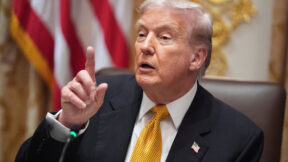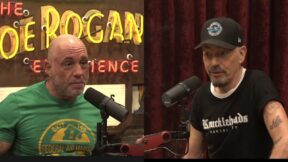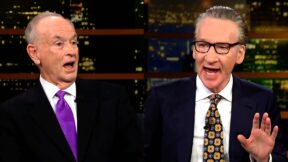‘An Assembly Line of Grieving’: CNN’s Bill Weir Talks Reporting From Brazil, Where Bolsonaro ‘Runs By the Same Playbook’ as Trump
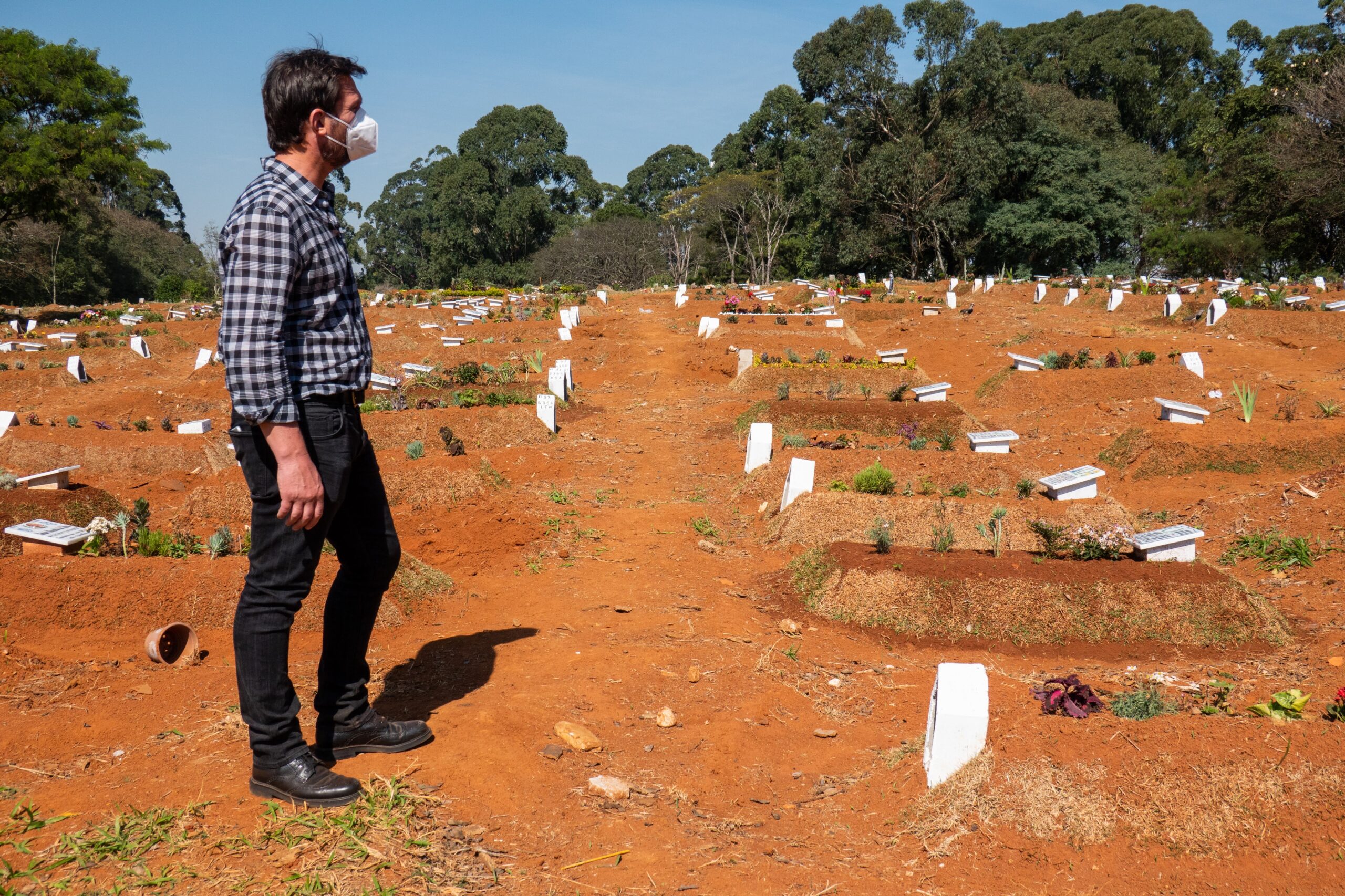
Bill Weir stands at Vila Formosa Cemetery in Sao Paulo, Brazil. Courtesy of Evelio Contreras | CNN
To fully understand Covid-19 in Brazil, CNN’s Bill Weir says you have to see the fresh graves.
At the biggest cemetery in Latin America, there’s 8,000 new piles of dirt filled with 8,000 new bodies. People wanting to mourn their loved ones have just 10 minutes to do so.
“It’s like an assembly line of grieving,” Weir said.
In Brazil, the nation’s second-highest hot spot for recorded coronavirus cases, this is life during a pandemic. Like the United States, the country’s cases are still climbing. Its president, Jair Bolsonaro, has downplayed Covid-19 since the beginning, even after contracting the virus in July. He’s fired several health officials and pushed for hydroxychloroquine as Brazil’s solution, all the while pulling publicity stunts to maintain his image.
Weir just came back from 10 days reporting in Brazil and is now quarantining in a hotel in his neighborhood so he can see his newborn son from a distance. The longtime CNN reporter detailed covering Brazil’s administration, comparisons he makes between Bolsonaro and President Donald Trump, and how the country is handling its recent surge of cases in a new interview with Mediaite.
What were your days in Brazil consisting of?
So we started in São Paulo and did a lot of big city on the street reporting as they began sort of widespread reopening. We were there just as luck would have it when President Bolsonaro tested positive for Covid-19 after so many months of dismissing it as a ‘little flu.’ So it suddenly became a much more ironic story with him becoming the most famous Covid patient in the country.
We drove 10 hours into the literal geographic center of the country to see how the virus is really tearing through indigenous communities, agricultural communities. They’re using the prescribed anti-malarial drugs that are unproven in clinical trials, but zealously endorsed by Bolsonaro after President Trump recommended this as a possible miracle treatment. The Brazilian president doubled down on it. He has his military making this stuff by the millions of doses and has his military distributing it, so we wanted to go see what that would look like. It was fascinating.
It was really an interesting glimpse into another culture and how they’re managing it, and how so much of it comes from this vocal personality at the top. So many different parallels with the United States, but he takes it steps further.
I know there’s an easy comparison to make [Bolsonaro and Trump]. I think in one of your stories from Brazil you wrote of Bolsonaro as “Tropical Trump.” To an outsider, how would you compare the two from a leadership and policy standpoint?
The parallels here are the White House battling with their top doctors like Dr. [Anthony] Fauci. There’s concern when that back-and-forth gets heated, he’s gonna fire Dr. Fauci. Well, Bolsonaro did that. He fired his top health minister, who was a doctor who was basically just arguing for more social distancing and saying, ‘Don’t put all your faith in malaria drugs.’ When he got fired, his replacement lasted less than a month. And he was pushed out because he wouldn’t stop speaking science to power.
Now, he put a general in charge of the entire pandemic response. So imagine if President Trump put one of his loyal generals and put them in charge of the entire Covid response — a general who never talks to the media and is distributing controversial drugs into the poorest neighborhoods and Native American reservations. That’s what Bolsonaro was doing. He’s on record saying he rather his sons die in car crashes than come out gay, and he’s celebrated a military dictatorship in genocide in just the most latent terms. He proudly owns that.
In the United States, there’s Coronavirus Task Force briefings, Kayleigh McEnany does briefings, and sometimes Trump will answer questions. I know you said some officials won’t speak to the media, but what’s the country’s process like doing interviews and interacting with reporters?
It was a real interesting lesson in sort of presidential media relations in a different country. [Bolsonaro] also has a very antagonistic relationship with the national press, which in Brazil they still have a pretty independent judiciary and a pretty robust press as sort of the firewalls of their young democracy. As an example, he’ll wait [for] the national news network or CNN — Brazil goes off the air for the night — to say, ‘I took a Covid-19 test.’ He’ll wait to make news.
He plays these tug of war games. It’s sort of up to each governor to be as vocal and proactive as they want to be. What you have is a bunch of reporters staked out in front of the presidential palace, which is this modernist building behind a long, huge lawn, so you wait for him to wander out when the mood strikes.
Were you out there waiting for him?
I did. We just wondered if he would make news. He said he was going to take another test. We thought if that test is somehow negative, he’s just going to want to get out, so we’ll follow him and see how that goes. In the end, he was positive again for the second time in a week. Then, since we left, he held sort of a mini rally on basically the lawn of the palace where a bunch of supporters came out and cheered him and he held up his hydroxychloroquine. The tropical Trump nickname sticks because he’s such a populist who runs by the same playbook.
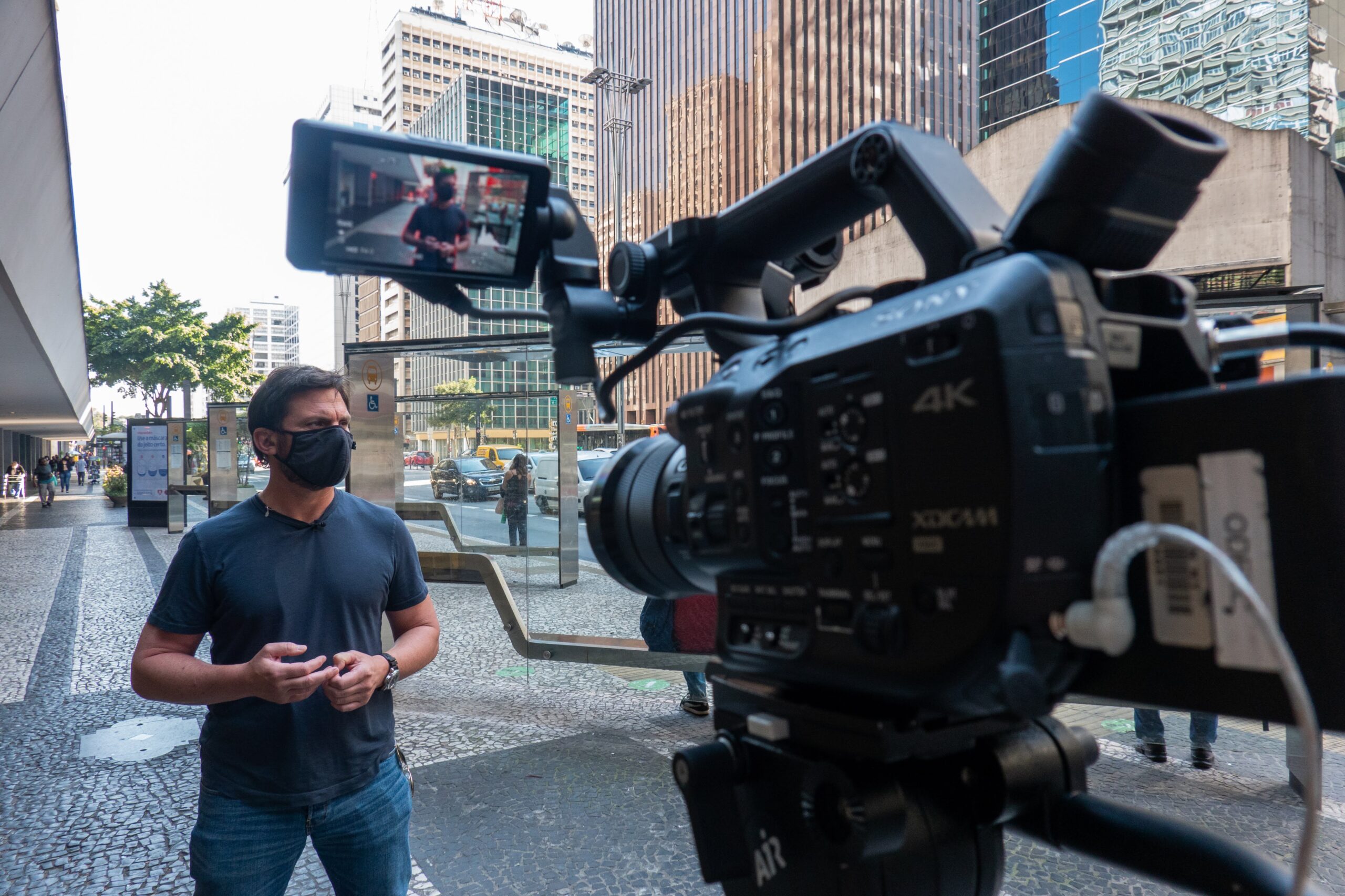
Courtesy of Evelio Contreras | CNN
Why do you think he’s become so attached to hydroxychloroquine as the solution?
According to his health minister, the first one who was fired Luiz Mandetta, it’s an easy solution because in that part of the world is relatively cheap and accessible. They have a lot of it because of malaria. The health system in Brazil is considered one of the more sophisticated public health systems in Latin America. But Bolsonaro politicized it from the very beginning, dismissed it, and made it clear that he’s much more afraid of the economic impact of a quarantine than he is the death rate.
We went out to the biggest cemetery in Latin America where they had just dug 8,000 fresh graves. Until you stand on a hillside and look at what 8,000 fresh graves looks like, and the funerals are happening so fast. Each family is limited to 10 minutes to say goodbye. It’s like an assembly line of grieving. His decisions, like countries all around the world, are immediate life or death being influenced by policies at the very top.
When Bolsonaro got diagnosed with Covid-19, was there any indication of a shift in Brazil’s response? Did it maybe get a little more serious within the administration or were there adverse effects. Or just mostly the same?
Not really. I think his critics worry that he’s going to use it to say, ‘See, I was right. I got it. It’s not that bad. I took my favorite meds and I’m raring to go. Let me be an example to the rest of you.’ There hasn’t been, but again, it’s sort of the way I’ve seen it.
My travel across the United States has been it’s been pretty limited, but from what I see on social media and stuff, some cities are all in and they have clever campaigns to get you to wear a mask. They get celebrities involved. They’re like pushing every button they can. Then other cities are dragging their heels. I think it’s the same thing in a country like that. That’s why this whole pandemic is such a test of democracy, especially diverse ones like ours where everybody has an opinion and it’s in our blood to question authority, especially when they tell you to put something on your face. It’s sort of an anathema to the American ideal.
But you look at Vietnam, they’ve got 90 million people, a border with China, and zero deaths from Covid-19. So it’s doable, it’s doable. It’s just a test of how coherent and disciplined your society is and whether they can follow those rules out of fear or love — that’s up for debate. But the ones that figured out how to do it, they’re surviving.
You said earlier Brazilians haven’t really questioned mask-wearing unlike the United States, at least early on. Why is that?
I think it’s the result of them putting trust in experts they see on the media as opposed to their political party or that leader, sort of a similar breakdown to the United States. If you’re not wearing a mask proudly, I could probably tell where you get your news and how you vote. It’s become sort of a virtue signaling thing.
I think it’s the same there in Brazil where there’s again, a huge demonstration in front of the Congress in Brasília, but then you hear cars honking by cheering vocal chants — it’s the same as Make America Great Again as a rallying cry. I flew from Brasília, São Paulo to Houston to Newark and didn’t see a single adult without a mask. I think it’s globally, the message is spreading.
How was travel between the two biggest hotspots in the world? What precautions were you taking?
We tried to be super careful on this trip. I covered at least a week’s worth of the rallies in New York after George Floyd’s murder and tested negative twice, so I had faith in sort of the power of mask-wearing and staying outside. In Brazil, we would spray our disinfect and leave all the windows open and everybody had a mask on all the time. We always ate outside, worked outside in the middle of the country, on the riverbank, surrounded by feral cats and like an armadillo would wander up. It’s very cool.
In hotels, it’s interesting, everything you order like your food is wrapped in plastic. Flying, the flights all down were completely empty, but then within the country packed. To be in a middle seat on a packed flight is startling these days. But two glasses, two masks on and goggles and fingers crossed. We’re being really careful with travel. I have to sit in quarantine now for two weeks, I can get stuff done and I’m doing other stories as best I can. This whole thing has really changed the way I tell stories and cover the world.
This interview has been condensed and edited for clarity.
